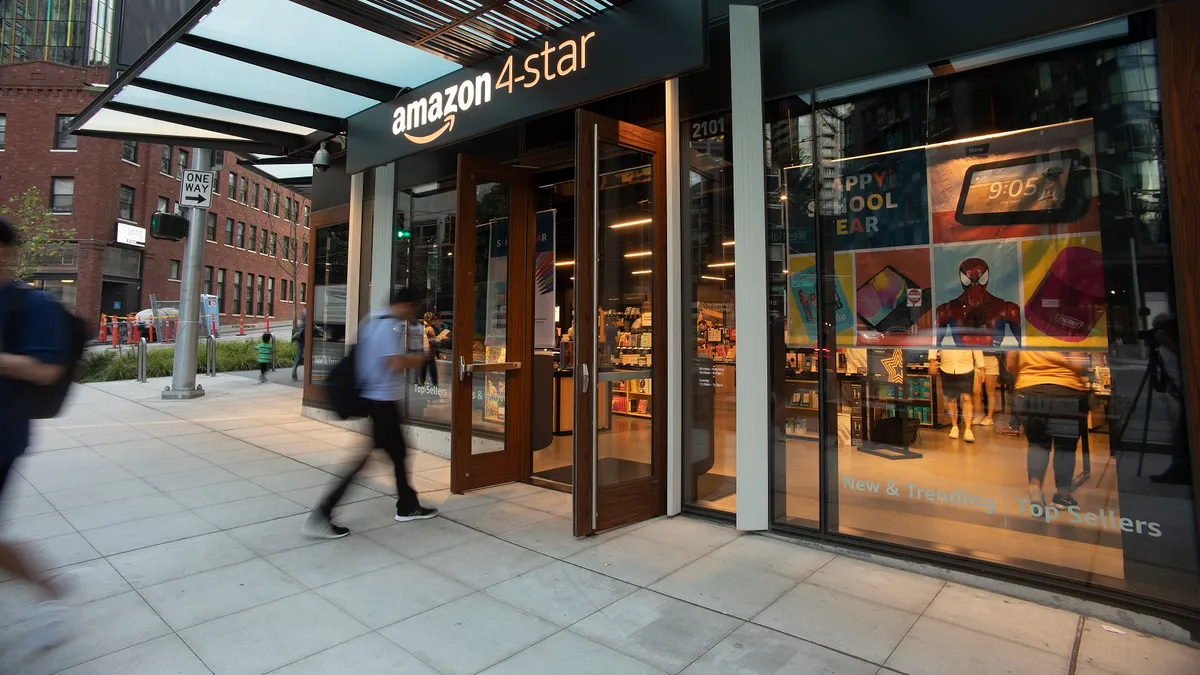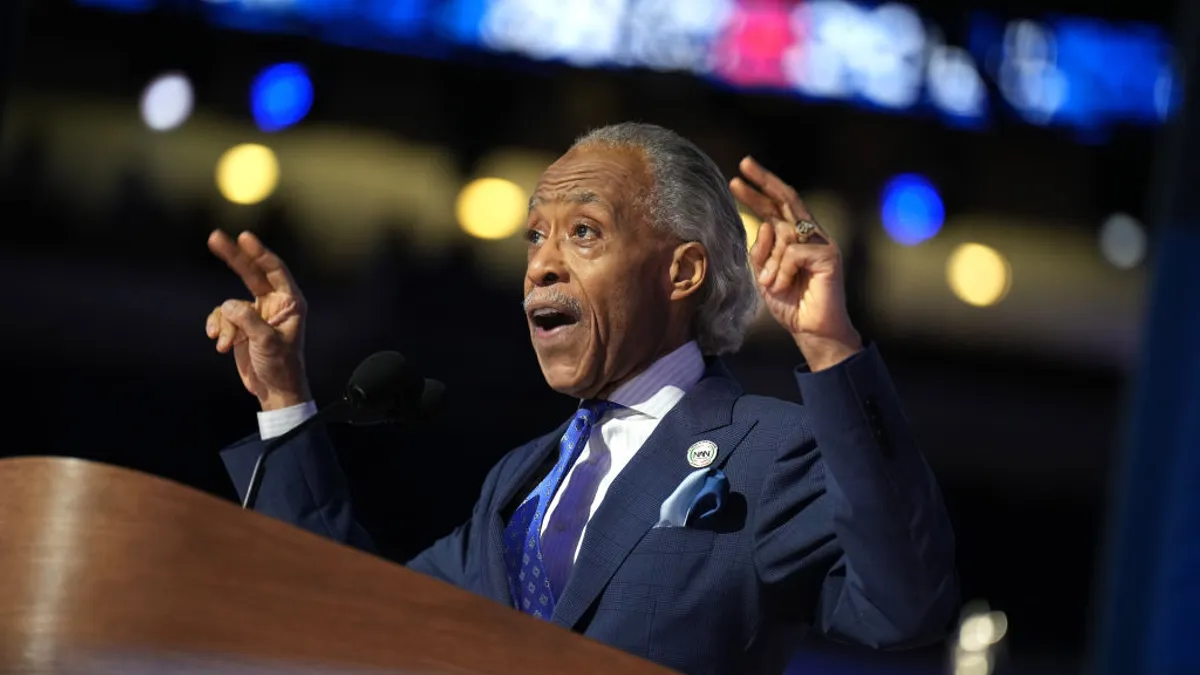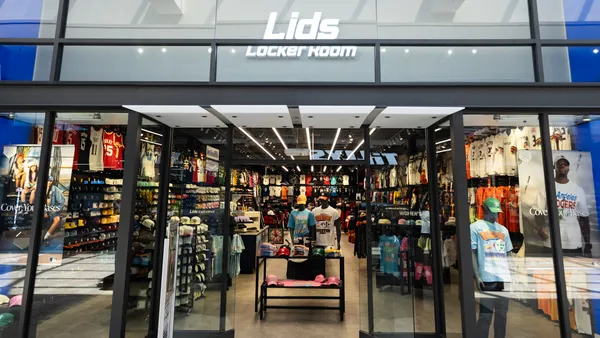About 20 years ago, Jeff Bezos told CNET Magazine that the then-eight-year-old company wanted to become “something completely new” in retail.
“There is no physical analog for what Amazon.com is becoming,” he said. “And our vision hasn't changed at all the last few years.”
In a complaint against Amazon alleging anticompetitive behavior, the Federal Trade Commission and attorneys general from 17 states echo this, but also say those days are gone. Their lawsuit alleges “a set of punitive and coercive tactics to unlawfully maintain its monopolies,” especially toward the marketplace sellers that are responsible for moving 60% of the merchandise sold on the site.
The FTC cites third-party analysis in noting Amazon's control of e-commerce, including eMarketer Insider Intelligence's finding of an 82% share of gross merchandise value among the four top U.S. online marketplaces, (Amazon, eBay, Walmart and Target) last year. Amazon has a 37.6% share of the U.S. e-commerce market in general, according to Insider Intelligence research emailed to Retail Dive.
“The early days of online trade were bursting with possibility,” the FTC writes in court documents. “Competition flourished. A newly connected nation saw a wide-open frontier where anyone with a good idea would have a fair shot at success. Today, however, this wide-open frontier has been enclosed. A single company, Amazon, has seized control over much of the online retail economy.”
Just a piece of a massive market
As the e-commerce giant is preparing to face these claims in court, several analysts, and the company itself, seem to be shying away from the idea that Amazon is a unique and powerful player. What the FTC describes as anticompetitive, they argue, is commonplace in the retail industry and has been for decades.
“Amazon may not be the small business it once was, but we’re still just a piece of a massive and robust retail market with numerous options for consumers and sellers,” David Zapolsky, Amazon general counsel and senior vice president of global public policy, said in a blog post on Sept. 26, following up on initial comments on the FTC’s move.
"We’re still just a piece of a massive and robust retail market with numerous options for consumers and sellers."

David Zapolsky
Senior Vice President, Global Public Policy and General Counsel, Amazon
The view is shared by some retail analysts and antitrust experts. Last year’s retreat from much of Amazon’s previous brick-and-mortar retail effort is one example of its weakness in a diverse and cutthroat market, according to GlobalData Managing Director Neil Saunders.
“Retail is buzzing with competition, which is one of the reasons Amazon has to constantly [innovate] and work so hard to succeed,” he said in emailed comments. “It is also one of the reasons why Amazon sometimes fails, as it has done with various store ventures and in some parts of the grocery market.”
Walmart’s recent assertiveness around its own online marketplace and pricing initiatives, which several analysts see as taking share from Amazon, Target and others, is further proof that Amazon has plenty of competition, others say. Arun Sundaram, senior equity analyst at CFRA Research, (like many commenting on the long-anticipated FTC antitrust action), used the words “uphill battle.” Also like others, he predicted little would change at Amazon as a result of it.
"We see evidence to suggest online marketplaces in the U.S. are competitive, with the recent success of Walmart's third-party marketplace as an example,” Sundaram said in a research note. “Additionally, the FTC could have a tough time defending its stance that Amazon's current business practices are harmful to consumers. Overall, we see low risk of major structural changes at Amazon.”
Routine retail practices
It’s not just that the retail environment remains competitive in general, but also that specific conduct targeted by the FTC as anticompetitive is longstanding industry practice, some experts say.
John Mayo, founder and executive director of Georgetown University’s Center for Business and Public Policy and an antitrust scholar, noted that Amazon’s seller fees, pricing requirements, prioritization of its own brands and treatment of search results — flagged in the lawsuit as ultimately harmful to sellers and consumers alike — have counterparts in brick-and-mortar stores. For example, retailers strike favorable pricing agreements with vendors, enjoy greater margins on store brands that mimic name brands, and charge extra for optimal shelf placement and marketing.
“Coca-Cola or Pepsi might pay for an endcap position, or Bush’s Beans or whoever it is. Nobody tells the consumer, when they walk into the supermarket, that Bush’s Beans has paid for that product placement,” he said by phone. “That is a business practice that is employed extraordinarily widely, both online and offline, and it's not routinely thought of as an anticompetitive practice. It is a way to differentiate yourself and to try to attract more business.”
“Coca-Cola or Pepsi might pay for an endcap position, or Bush’s Beans or whoever it is. Nobody tells the consumer, when they walk into the supermarket, that Bush’s Beans has paid for that product placement."

John Mayo
Founder and Executive Director, Georgetown University Center for Business and Public Policy
Not all antitrust experts are so dismissive of the FTC’s arguments. Greg Asciolla, partner at DiCello Levitt and chair of the law firm’s antitrust and competition litigation practice, said the complaint is complex, involving “an interrelated web of conduct.” But it also “demonstrates the FTC has a keen understanding of the markets at issue.”
“It lays out a plausible claim that Amazon violated federal and state antitrust laws by engaging in exclusionary, monopolistic conduct that harmed competition in two markets, resulting in injury to sellers and shoppers through higher prices and reduced quality,” he said by email. “While the case may present some complicated issues, the antitrust laws have successfully tackled intricate industries and multi-faceted conduct over the last century, and this case should be no different.”
The antitrust argument
Put simply, the FTC alleges that Amazon exercises power over its marketplace sellers, to their detriment as well as consumers’.
The e-commerce giant locks sellers into its ecosystem — both its Prime membership audience as well as its warehouse and fulfillment network — slaps them with rising fees and hampers their ability to sell via their own websites or other platforms, according to the FTC complaint and some sellers themselves.
All of this hurts sellers, but ultimately shoppers as well, the argument goes. Amazon and some experts see the requirement that sellers offer their lowest price on Amazon as consumer-friendly. However, the FTC and some sellers say it forces higher prices across the board because the high cost of doing business on Amazon’s marketplace means sellers must either raise prices elsewhere or lose money on Amazon.
"What we need to focus on here is that millions of Americans, who were trying to save money by comparing prices on the online shopping platform, were, in fact, cheated out of buying merchandise at a competitive price and higher quality, via a degraded online shopping experience."

Greg Asciolla
Partner and Chair of the Antitrust and Competition Litigation Practice at DiCello Levitt
“What we need to focus on here is that millions of Americans, who were trying to save money by comparing prices on the online shopping platform, were, in fact, cheated out of buying merchandise at a competitive price and higher quality, via a degraded online shopping experience,” Asciolla said. “This is just another example of a corporate behemoth using its market power to enrich itself while blatantly taking advantage of consumers.”
Can other retailers do this?
The case involves not just retail or online markets but “the high-tech arena,” Asciolla noted.
Three years ago Amazon faced questions from Congress over claims that the company would use seller data to copy best-selling goods for its own private labels. Earlier this year, the company said it would reduce its number of owned brands to fewer than 20.
Other aspects of Amazon’s high-tech prowess remain mysterious. Heavily redacted portions of the FTC complaint center around a proprietary Amazon algorithm dubbed “Project Nessie.” It’s unclear how many, if any, details will ever be known about this. The FTC says it is a secret algorithm that manipulates price, while the company's burgeoning ad system manipulates search, driving less relevant search results and charging shoppers more.
“In a competitive world, Amazon's decision to raise prices and degrade services would create an opening for rivals and potential rivals to attract business, gain momentum, and grow,” the FTC said in its complaint. “But Amazon has engaged in an unlawful monopolistic strategy to close off that possibility.”
Some sellers say that Amazon’s tight grip on pricing and search limits them drastically on and off the platform. Jason Boyce, a former Amazon seller, founder of seller consultancy Avenue7Media and author of “The Amazon Jungle,” said that sellers face drastic consequences if they attempt to run an omnichannel business.
“According to Amazon's own staff, if you sell your exact same product on Target.com for a penny less than you do on Amazon, your listing on Amazon gets what sellers commonly call ‘buy box suppression,’” Boyce said, speaking at a video press conference on Sept. 26. “Amazon's own people say that you will lose 40% of your regular revenue if your buy box is suppressed. That's one of the areas that the FTC has named, this pricing competition thing, where they're actually raising prices. That change alone, if not just Amazon but if all retailers were not allowed to control the price of a brand, I think that would blast open the doors of competition.”
"Amazon's own people say that you will lose 40% of your regular revenue if your buy box is suppressed. That's one of the areas that the FTC has named, this pricing competition thing, where they're actually raising prices."

Jason Boyce
Former Amazon seller and Founder of Seller consultancy Avenue7Media
Sellers also said they are forced to pay exorbitant fees in order to show up in Amazon search results.
The e-retailer in recent quarters has flagged advertising as a rapidly growing and profitable part of its retail business. What Amazon calls “advertising” is more of a search priority, which interferes with organic search results. When search results are “organic,” they are determined algorithmically rather than according to which sellers pay for advertising or some other determinant.
“Amazon's online storefront once prioritized relevant, organic search results,” the FTC said in its complaint. “Amazon shifted gears so that it now litters its storefront with pay-to-play advertisements.”
The FTC isn’t alone in saying this degrades the experience for customers. Evercore analysts last year warned that customer disappointment in Amazon was on the rise due in part to a proliferation of inferior merchandise, delivery delays and the “increasing rollout of advertising inventory in its product search results.”
What’s next
This case will likely drag on for years, and in fact may not even commence for quite some time. But it may be effective nevertheless, and maybe soon.
The European Union has already extracted concessions from Amazon that some sellers say would go far if they could be applied in the U.S. In December last year, the EU announced new rules restricting Amazon’s use of its marketplace sellers’ data; enhancing their access to Amazon’s “buy box;” and easing sellers’ and shippers’ participation in Prime.
In a video press conference last week following the FTC’s announcement, Stacy Mitchell, co-executive director for the Institute for Local Self-Reliance, told reporters that the ideal outcome would be for Amazon businesses — which now include cloud services, warehouse and fulfillment services, retail, a streaming service and more —to split into individual components.
That would force Amazon to follow its own rules, including paying the fees it requires of the sellers who use its platform. However, in a 2017 Yale Law Journal article that also argued that Amazon deserved antitrust scrutiny, now-FTC Chair Lina Khan said that breaking the e-commerce giant up along its business lines was likely politically unfeasible.
More realistically, several Amazon sellers joining Mitchell last week said they would like to see Amazon pull back on some of its more draconian requirements. The lawsuit’s very existence may accomplish that, Mitchell said.
“I do think that the filing of a lawsuit in and of itself, and we know this from history, does tend to put companies back on their heels a bit,” she said. “And so one of the great benefits of this having happened is it is going to make Amazon much more cautious about what it does now.”





















